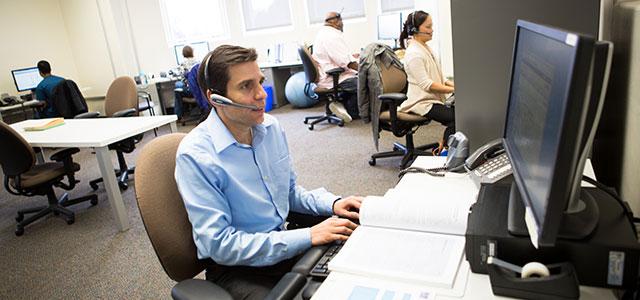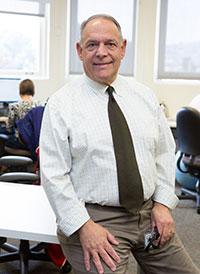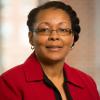
Nurse Practitioner Jonathan Van Nuys answers the telephone hotline at the National HIV/AIDS Clinicians’ Consultation Center at San Francisco General Hospital (photos by Elisabeth Fall).
NP Students Strengthen HIV/AIDS Hotlines for Medical Providers
Thousands of miles from San Francisco, an emergency room nurse pricks her finger while administering pain medication to a patient who happens to be HIV-positive.
Frightened by her exposure to the virus – also confused and embarrassed – the nurse seeks advice from her supervisor, and with a few lingering questions, they reach for the phone. The voice on the other end – reassuring and knowledgeable – calmly listens to the nurse’s fears and suggests some next steps.
The scenario is fictitious, but it is representative of the thousands of calls handled annually by clinicians working the telephone hotlines of the National HIV/AIDS Clinicians’ Consultation Center (NCCC), housed at San Francisco General Hospital (SFGH) – the Warmline for medical treatment, the PEPline for postexposure prophylaxis such as needlesticks, and the Perinatal HIV Hotline for issues in pregnancy and delivery.
The only advice center of its kind in the nation, this free, confidential service was started officially in 1993 as a way of sharing UCSF’s renowned expertise in HIV and AIDS with health care providers nationwide.
Historically, physicians and some pharmacists have staffed the lines, but this year, for the first time, nurse practitioner students and recent graduates are working as PEPline and Perinatal Hotline consultants in a pilot collaboration between the center and UC San Francisco School of Nursing. The School’s adult-gerontology nurse practitioner HIV specialty focus is a natural pipeline for bringing new expertise to the lines, program officials say.
“The NP students bring a ton of clinical savvy and enthusiasm,” says Brenda Goldhammer, NCCC project manager. “They arrive with a fantastic zeal for learning new information, which we all find contagious. In addition, they have excellent communication skills, which are critical for a telephone consultation service such as ours.”
Hub of Expertise
 Ron Goldschmidt From early on in the AIDS epidemic, the de facto medical expertise epicenter was San Francisco – and UCSF, in particular. The hotline program, which is funded by the Health Resources and Services Administration (HRSA), was a logical way of formalizing this expertise, says UCSF physician and HIV expert Ron Goldschmidt, who conceived of and developed the program. “San Francisco held a lot of wisdom in terms of HIV, and people wanted to know more and learn more, and they kept coming to us,” he says.
Ron Goldschmidt From early on in the AIDS epidemic, the de facto medical expertise epicenter was San Francisco – and UCSF, in particular. The hotline program, which is funded by the Health Resources and Services Administration (HRSA), was a logical way of formalizing this expertise, says UCSF physician and HIV expert Ron Goldschmidt, who conceived of and developed the program. “San Francisco held a lot of wisdom in terms of HIV, and people wanted to know more and learn more, and they kept coming to us,” he says.
The Warmline was launched first, in 1993, with the PEPline added in 1997 and the Perinatal Hotline in 2004.
Goldschmidt expects that when the 2013 numbers are tallied, the lines will have received more than 15,000 calls from clinicians nationwide, including doctors, nurses, medical assistants, phlebotomists and dentists. “The entire range,” says Goldschmidt, who still directs the program. “As national experts, we have to communicate well and understand what people’s needs are.”
All of the consultants are salaried workers, including the NP students. And while there is intensive training and ongoing learning on the job, each consultant is an expert in his or her own right.
“You have to be an excellent communicator; you have to be able to consult; you have to be able to make clinical decisions when there are lots of variables and not a clear answer,” says Suzan Stringari-Murray, co-director of the School’s adult nurse practitioner program, project coordinator of its HIV specialty and the School’s faculty liaison with the hotline program.
Adding Nurses a “Home Run”
The idea to reach out to nurses was triggered by challenges in finding physicians and pharmacists to staff the lines, but quickly morphed to a value-added step, says Goldhammer, who got the ball rolling after reviewing data showing a large number of nurses using the line for help.
“I recognized that we had a unique opportunity to create a peer-to-peer model by having nurses staff our PEPline,” Goldhammer says.
Networking brought her to Stringari-Murray, and enthusiasm for a partnership blossomed. “It was one of those ‘Let’s try this,’ and it turned out to be a home run,” says Stringari-Murray. “It allowed the NCCC to staff their line, and we could provide an educational opportunity for the students.”
The pilot included four students, all registered RNs in their second year of the nurse practitioner program, with a focus in HIV. So far, they’re working only on the PEP and Perinatal lines, but this could expand as the program grows.
While the job doesn’t qualify as helping to fill the required clinical hours for a nurse practitioner license, it’s rich in skills-building potential, says Stringari-Murray. This includes experience in working with a team, consulting with other providers, using evidence to make clinical decisions and staying ahead of the knowledge curve in a clinical specialty.
“It’s essentially raised the bar for the students, as they can learn both by observing and [by] participating,” she says.
“We offer an incredible clinical experience that allows the students to work side by side with clinicians from different modalities,” says Goldhammer. “Our staff are considered experts in the field, so under their mentorship, the students appreciate being able to become experts themselves, especially in the area of postexposure management, which is very important for nurses.”
“Best Experiences of My Life”
The program at San Francisco General is a hub of hotline activity, where consultants help each other with cases, tapping into individual skills and experience.
Jonathan Van Nuys, one of the NPs working the line and a 2013 graduate of the School’s nurse practitioner program, calls the work “one of the best jobs I’ve ever had. HIV is my passion and specialty.”
Van Nuys just got a job at the East Bay AIDS Center but will continue contributing some hours as a hotline consultant. “I am surprised every day that I work at NCCC,” he says. “No matter how many times you think you’ve heard every possible scenario of a potential blood-borne pathogen exposure, someone calls with an entirely new twist that challenges my knowledge.”
He appreciates the program’s multidisciplinary, collaborative approach, high standards for clinical excellence, respectful debates of guidelines and “vibrant” weekly care conferences, as well as the flexible schedule.
“I have clinicians of all levels calling me from all over the country to ask for expert advice and consultation, and they are always grateful to receive the advice,” he says. “I feel proud of my ability to offer it.”



